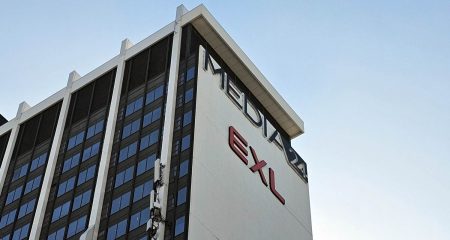
Prosus’s new interim CEO inherits a conundrum from his predecessor: how to bridge the yawning gap between the value of the company’s stock and its assets.
It will be a challenge for Ervin Tu, who assumed the top job last week following the departure of Bob van Dijk. Prosus, the Dutch investment arm of Naspers, is still valued at well below the sum of its parts despite its push to unknot a complicated cross-holding structure and boost share buybacks.
The sticking point is its US$93-billion stake in Chinese tech giant Tencent Holdings, with some investors steering clear of firms with large China exposure due to the country’s faltering post-Covid rebound and rising geopolitical tensions. Prosus’s stock performance is highly correlated to that of Tencent.
Strategically, Prosus is “doing the right things” in terms of simplifying its structure, said Osamu Yamagata, a London-based portfolio manager at Abrdn. But the firm’s ability to narrow the discount to its own assets may be more dependent on “issues out of their control and that is around the attractiveness of the Chinese economy”.
On paper, the aggregate value of the Amsterdam-listed investment firm’s assets is worth about €125-billion (R2.5-trillion), or €45.80/share, according to a company tracker as of 27 September. But on public markets, its share price is almost 40% below that figure. Essentially, all Prosus assets outside of the Tencent investment – bought in 2001 in one of its most successful bets ever – are valued at less than zero.
To convince investors that it’s undervalued, Prosus launched a buyback last year, funded by a gradual selling of its Tencent stake. Having traded more than 50% below the sum of its parts for first half of last year, the buyback announcement quickly narrowed the gap to 30%. But since then, the discount has been fluctuating around the historical mean of around 36%, according to estimates by HSBC analysts.
Unusual arrangement
Van Dijk stepped down last week as the head of the tech investing group after removing a complicated shareholder structure that he had set up. In an unusual arrangement, Amsterdam-based Prosus owned nearly half of its Cape Town-headquartered parent company Naspers. The structure, which was introduced in 2021 as an attempt to address the distorting effect of the company’s large stake in Tencent, was criticised by some investors as complex and ineffective.
“We have no plans to further simplify our group structure,” Prosus said in an e-mailed response to questions. On the discount, the company said: “We haven’t given an exact discount level at which we expect to trade but we are comfortable that there is a long way to go before we will stop.”
Read: Interim Prosus CEO Ervin Tu promises discipline and stability
As a first step for how Tu can attract investors and boost Prosus’s value, analysts have said monetisation on some smaller assets could help. Also, Bloomberg Intelligence analyst John Davies said investors are waiting to see evidence that the conglomerate is spending returns from Tencent effectively, given it sits on over $15-billion of gross cash. On monetisation of assets, Prosus said it is evaluating options including listings or spinoffs, or selling or merging businesses.
Further simplification of the corporate structure will also be welcomed. The current setup remains complex as it uses two classes of stocks to give controlling parties extra voting rights, said Abrdn’s Yamagata.
Still, for now, Prosus’s stock performance will be highly related to that of Tencent, given three-quarters of its sum-of-the-parts value lies in the Chinese tech giant. While Prosus’s portfolio contains over 80 companies that operate in areas from food delivery to fintech, much of these are small unlisted assets that don’t have live pricing.
“Prosus may serve as an imperfect proxy for the Chinese venture for some time,” Bloomberg Intelligence’s Davies wrote in a note. — Henry Ren, with Loni Prinsloo, (c) 2023 Bloomberg LP




